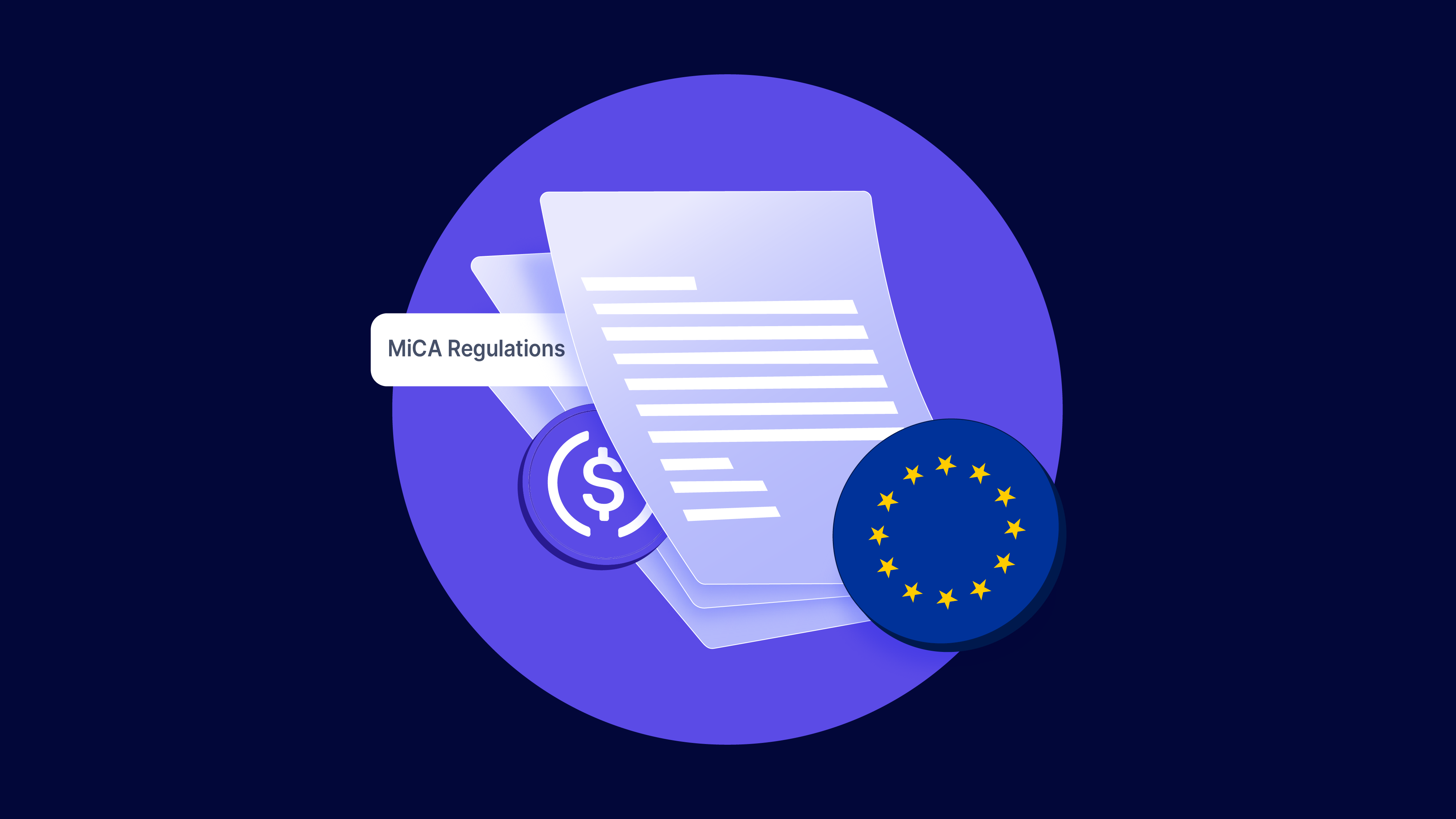
Accept crypto with CoinGate
Accept crypto with confidence using everything you need in one platform.
Crypto Regulations in Europe: How Will New Rules Affect CoinGate Clients

The cryptocurrency industry is growing rapidly, and with that growth comes the need for clear regulations.
Enter Markets in Crypto-Assets (MiCA), a new regulatory framework from the European Union designed to bring more stability, transparency, and consumer protection to the crypto world.
MiCA regulations are set to go into effect in stages. The key dates are:
- June 2024: The regulations related to stablecoins (Asset-Referenced Tokens and E-Money Tokens) have already taken effect.
- December 2024: The broader regulations covering the rest of the crypto-assets and service providers will become applicable.
- July 2026: The so-called grandfather clause is expected to end, meaning companies will no longer be exempt from complying with the new rules (the exact date will depend on local regulators).
Since it directly affects CoinGate company and all of our clients, in this post, we’ll break down what MiCA is, highlight the key changes it introduces, and explain how these changes will impact your operations.
What is MiCA?
Markets in Crypto-Assets (MiCA) is the European Union’s new set of regulations for crypto-assets.
The goal of MiCA is to create a unified legal framework across all EU member states, making it easier and safer to operate with crypto-assets within the EU.
MiCA covers various types of crypto-assets, including popular cryptocurrencies like Bitcoin and stablecoins. It also sets rules for service providers, such as exchanges and payment processors like CoinGate.
Key Changes MiCA Brings
MiCA introduces several important changes that will impact how businesses establish internal operations and interact with crypto-assets. Here are the most significant ones:
1. Harmonized Regulations Across the EU
MiCA creates a single set of rules for all EU member states that all companies must adhere to. This means that once a crypto-asset or service provider, like CoinGate, is authorized in one country, it can operate across the entire EU.
This reduces the need for businesses to navigate different regulations in different countries, which should encourage regular businesses to perceive crypto service providers as any other financial instruments rather than exotic, alternative payment rails.
2. Enhanced Consumer Protection
MiCA also emphasizes the importance of consumer protection. It requires clear and transparent information about the crypto-assets you use, ensuring that your customers are well-informed about the risks and characteristics of these assets.
Our Operations Manager, Eimantas Valančius, clarifies: “We will have policies that we must make public (conflict of interest, commercial policies such as pricing, and fraud). We will also need to conduct due diligence on crypto assets, maintain higher capital reserves (partly for consumer protection), and provide a full and detailed explanation to the Bank of Lithuania on how we operate—so they trust that we properly segregate client funds. Lastly, we will need to partner with a credit institution (i.e., a bank) to hold both our capital and clients’ fiat funds in a safeguarding account.”
3. Stricter Rules for Stablecoins
Stablecoins, which are digital assets pegged to stable assets like fiat currency, face more stringent regulations under MiCA. Issuers must maintain adequate reserves and ensure that these coins can be redeemed at any time.
Progress is being made by stablecoin issuers on this front. In July of 2024, Circle, a global financial technology firm and the issuer of USDC and EURC stablecoins, became the first global stablecoin issuer to become compliant with the MiCA regulatory framework.
However, Tether’s USDT, the most popular stablecoin in the market, is yet to achieve compliance with MiCA, and, at the time of writing, its future remains uncertain.
4. Market Integrity Measures
To prevent market abuse, MiCA introduces rules against insider trading and market manipulation. We are implementing and upgrading these measures as we speak to maintain a fair and transparent marketplace, protecting your business from potential risks associated with fraudulent activities.
Our Operations Manager highlights some of these measures: “We are introducing prudential safeguards, such as additional financial calculations to enhance client security. We’ll also be implementing a comprehensive new risk management framework, supported by a dedicated risk officer, along with an outsourcing policy and the creation of a business continuity plan. This process will also improve our governance arrangements.
In essence, this licensing process is pushing us to evolve and become better.”
5. Licensing and Supervision
Crypto-asset service providers like we are will need to be licensed and authorized by EU regulators. This will ensure that you’re using a platform that meets the highest standards of security and compliance, which should give clients more peace of mind when handling crypto payments.
As Eimantas explains: “We will need to report to local regulators, with possible quarterly and yearly audits to ensure compliance. Supervision will be key, as these audits may be conducted in person, significantly impacting how we operate. In addition, we’ll implement prudential safeguards, a new risk management framework, outsourcing policies, and more robust governance arrangements to continuously improve security and operations.”
Common Questions About MiCA Answered
The new regulations are bound to raise questions. Here are answers to the most common ones we hear from concerned businesses:
1. How will MiCA affect my ability to accept cryptocurrency payments?
MiCA provides a safer and more regulated environment for crypto-assets. This means more stability and trust for your business. CoinGate will have to ensure that the cryptocurrencies you accept are compliant with MiCA’s standards. We will also need to adhere to the Transfer of Funds Regulation (TFR), which means collecting more information about both the sender and the receiver of crypto transactions.
2. What changes do I need to make to my business to comply with MiCA?
You may need to review how you handle crypto-assets, ensuring transparency and understanding the risks involved. This might involve updating your terms and conditions or providing more detailed information to your customers. We will help you make any necessary adjustments if necessary.
3. Will MiCA impact the types of cryptocurrencies I can accept through CoinGate?
MiCA sets specific requirements for certain types of crypto-assets, especially stablecoins. While CoinGate will ensure that all supported cryptocurrencies are MiCA-compliant, in turn you will notice changes in the availability of some assets. Rest assured, we’ll keep you informed and offer alternatives as needed.
4. How does MiCA enhance consumer protection, and what does that mean for my customers?
MiCA requires clear disclosure of information about the crypto-assets you use, which will help your customers make informed decisions. Ultimately, this increased transparency will build trust in your business and enhance the overall safety of the crypto market.
5. What are the benefits of MiCA for my business using CoinGate’s services?
MiCA simplifies the legal landscape by creating a unified framework across the EU. This reduces the complexity of operating in different countries and provides a more predictable and secure environment for accepting crypto payments. This could also attract more businesses who feel confident using cryptocurrencies in a regulated market.
Conclusion
MiCA is undoubtedly a significant step forward in regulating the crypto-asset market within the European Union. For businesses using CoinGate, this new regulatory framework brings increased security, consumer trust, and the opportunity to operate in a more stable and transparent environment.
We’re committed to helping you adapt to these changes and continue thriving If you have any questions or need assistance, don’t hesitate to reach out to us.
If you’re not our client yet but want to start using cryptocurrencies in your business in compliance with EU regulations, start by creating a CoinGate account.
Accept crypto with CoinGate
Accept crypto with confidence using everything you need in one platform.

